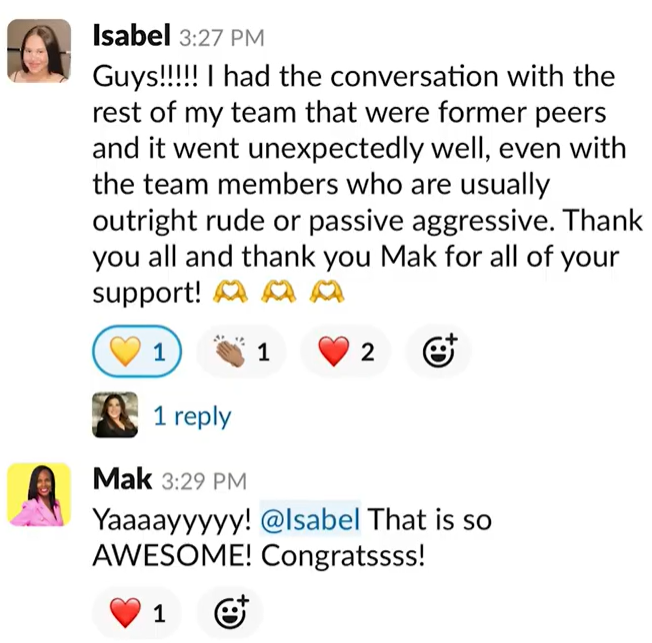4 Common Mistakes New Managers Make (That Are Completely Avoidable!)
Hi, I'm Mak. I'm a leadership coach for new managers who knows what it's like to be filled with overwhelm, self-doubt and terror that I’d let everyone down. My Story
FREE MICROCAST
How to Become an Effective Leader so You Can Build a High Performance Team
Learn how to delegate with confidence, navigate those tricky conversations (even for introverts!), and finally stop relying on Google to do your job.
Netflix < MakTV
THE YOUTUBE CHANNEL
No but really. This is the kinda content that’s actually healthy to binge. In fact, you become more of an awesomesauce manager with every video you watch.
Becoming a manager can be so exciting—but it can also be really overwhelming. As I’m sure you’ve discovered by now, no one sits you down and tells you exactly what you should be doing as a manager. So it’s very normal if you find yourself constantly looking over your shoulder, trying to figure out if you’re on the right track.
And unfortunately, from what I’ve observed as someone who regularly coaches new managers, a lot of new managers are not on the right track. So in this video, I’m going to reveal four rookie mistakes new managers make that immediately sabotage their ability to earn the trust and respect of their team.
I’m also going to share practical guidance and examples to help you avoid these mistakes and how to course-correct if you’ve already made them. And don’t feel bad, based on my experience working with over 260 managers inside the New Manager Accelerator program, it’s highly likely you’ve made at least one of them!
Mistake #1: Leading By Telling
One of the biggest mistakes new managers make is confusing “leading” with “controlling.” It usually comes from a good place—you want the project to go well, you want to show you’re on top of things—but when you start dictating tools, steps, and every tiny decision, it sends an unintended message.
Most of the time, leading by telling doesn’t create clarity; it creates friction. And if you’ve ever been on the receiving end of that, you know exactly how it feels: your confidence dips, your momentum stalls, and instead of focusing on doing great work, you’re focused on getting constant approval. That’s not leadership. That’s micromanagement dressed up as “being helpful.”
If you’re a new manager trying to lead your team, I want you to know that providing direction doesn’t mean you have to be in every detail. Great managers set the destination, not the route.
For example, if you have a capable team, you might want to start with a collaborative conversation about goals and outcomes, define what success looks like, and establish the boundaries (like deadlines, budgets, constraints) so that everyone knows the guardrails upfront.
Then, you can hand the steering wheel back to the person actually doing the work and ask for their plan. That simple shift turns ownership back where it belongs and builds trust instead of eroding it.
And yes, I’m the first to admit that everyone on your team is going to need a different type of “concoction” from you. Meaning, you’re going to have some team members who don’t need a whole lot of guidance—you give them the destination and they’re off. And then you’re going to have others who need a lot more guidance. Maybe because of their anxiety levels, their confidence, or their skill levels, they need more detailed direction along the route than other people do.
But that’s your job to figure out. You need to understand the mix that each team member needs so you can meet them where they are and provide the right amount of guidance, structure, and direction to help them be successful.
Now with that being said, it’s not always about what you say… sometimes it’s about your delivery. Which brings me to mistake number two.
Mistake #2: Information Dumping
Another common trap new managers fall into is overwhelming their team with information (“information dumping”) instead of actually communicating. It usually happens in high-pressure moments, like preparing for a busy season or rolling out a major change.
Basically, the manager dumps a long list of updates, processes, and expectations onto the team all at once—no structure, no check-ins, no space for questions. And while the intention is to be thorough, the impact is the opposite. People walk away feeling overloaded, unclear on priorities, and unsure whether they’re actually prepared.
At the end of the day, effective communication is not about delivering more information—it’s about delivering the right information in a way people can actually use. Strong managers slow down, open the conversation, and create room for their team to speak first. They start by inviting questions, surfacing uncertainties, and understanding where clarity is needed before diving into details. As they talk through the information, they pause to check comprehension, highlight the most important points, and tie everything back to the team’s real concerns. And once the meeting wraps, they follow up with resources and touchpoints so no one is left to fend for themselves.
This is what it looks like to tailor communication to your team instead of treating it like a one-way announcement. You prioritize, you adapt, you make sure the message is clear and digestible.

Mistake #3: Getting Derailed By Drama
The next mistake new managers make is letting secondhand information whip you into action before you have the facts. Managers will get hit with hearsay, drama, and opinions constantly. It’s easy to hear a snippet (like maybe an employee sounds unhappy), connect it to an old concern (like the 1:1 where you gave constructive feedback last week), and start scripting the whole story in your head.
Suddenly, your mad or upset and it’s possible that nothing has even happened yet.
When you react from that place—marching over, confronting, escalating—you’re not managing; you’re getting pulled into drama. That erodes trust, fuels defensiveness, and makes it harder to see what’s actually going on.
The solution is simple: pause and strip it down to facts. Thank the messenger, note what they heard, and then go verify directly (calmly and privately). If escalation is warranted, do it because the facts support it—not because emotions got there first. That’s how you stay grounded, protect the team’s culture, and actually solve the real problem.
Mistake #4: Letting Empathy Lower Your Standards
Another mistake new managers make is letting empathy quietly lower their standards. It usually shows up when someone on the team is going through a difficult season in their personal life. You notice their work slipping—missed deadlines, declining quality, less engagement—and you care about what they’re carrying, so you avoid the conversation. You tell yourself you don’t want to seem insensitive.
I know that in these situations, you hope the situation will resolve and things will naturally bounce back. But avoidance doesn’t help the employee, and it absolutely doesn’t help the rest of the team who are still performing at the level you expect.
The truth is, compassion is an incredible leadership strength—but it becomes a liability when it replaces accountability.
Your job is to deliver results and support your team in delivering theirs. And that means holding steady to the same performance standards while honoring the human being in front of you. You can acknowledge someone’s circumstances, offer flexibility where appropriate, and still be clear that the expectations for the role haven’t changed. Empathy should inform how you have the conversation, not whether you have it at all.
The fix is to approach the situation directly, privately, and with both care and clarity. Name what you’ve observed factually, express genuine support for what the person is navigating, and then collaborate on a plan to get performance back on track. You won’t get this perfect every time, and that’s okay. What matters is consistently working toward being both compassionate and accountable.
It’s Normal To Make Mistakes As a New Manager… That’s Why It’s a Good Idea To Get Support
I am almost certain you have made at least one of these mistakes. So many people have (and I have too!).
But the good news? You’re going to be okay. I know that for certain, and I have proof.
I had a student named Isabelle who joined the Accelerator program at a really tense time on her team. She had just transitioned from peer to manager, and as you may know, that’s always a tricky dynamic.
And to be honest, she didn’t necessarily handle that transition the best way. Like you, she didn’t know what she didn’t know. She thought the best way to ease the tension was to plaster on “nice”—trying to be extra kind to her former peers. But instead of helping, it made things worse. So she joined the Accelerator program to get support, and within a month, she sent this Slack message in our private community channel…

The truth is, you will never stop making mistakes. That’s part of being human—and definitely part of being a manager.
The goal isn’t perfection; the goal is to get faster at course-correcting.
How do you do that? With mindset, with skills, and with practice. And you can build all of those if you have a strong coach or mentor behind you.
If you do want my help, the best place to start is with my free training, where I break down my five-pillar Elevate Team Performance framework.
No matter where you are right now, it’s not too late to course-correct. In fact, in that free training I share tons of stories from NMA students who started out really rocky in their management role and still went on to have incredible success. Some got promotions, some received raises and bonuses—all because they followed the framework. Watch this training now.

August 25, 2024